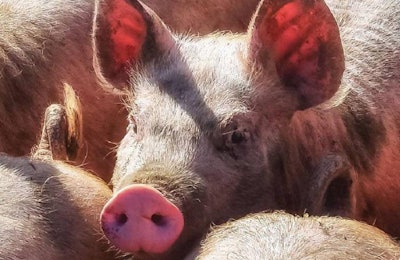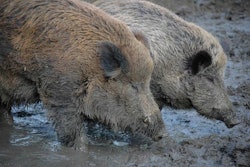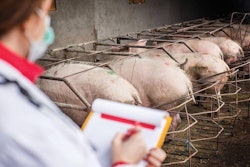
Further outbreaks of (ASF) have been reported in the Philippines, while the number of wild boar affected by the disease in South Korea has reached 347.
In the Philippines, a further six outbreaks of African swine fever (ASF) have been confirmed, affecting more than 20,000 pigs in backyard herds. These cases were in the provinces of Davao Del Sur and Davao Del Norte, according to the latest official report from the Department of Agriculture to the World Organisation for Animal Health (OIE). Almost 2,300 of the pigs died, and more than 18,300 were culled to prevent the further spread of the disease. These infections were confirmed over the period February 2-7.
Previous cases had been officially reported in Davao Del Sul, but these are the first in Davao Del Norte. Both provinces are on the island of Mindanao, where outbreaks began in January.
Communities in uninfected areas of the Philippines continue to be urged to maintain controls on pigs and pork products entering from other regions.
At a meeting this week, the City Veterinary Office for Legazpi reminded community leaders and meat traders to continue monitoring movements and health checks on pigs, reports Philippine News Agency.
Located in Albay province in the southeast of the island of Luzon, Legazpi is so far free of ASF, but the virus has been detected in neighboring provinces.
First ASF cases in the Philippines were identified in July 2019 on Luzon, according to the United Nations’ Food and Agriculture Organization (FAO).
More ASF cases in South Korea’s wild boar
Over the period March 4-10, a further 35 wild boar in South Korea tested positive for the ASF virus. Cases were found in the previously affected areas of Hwacheon in Gangwon province, as well as in the Yeoncheon and Paju regions of Gyeonggi. With extensive forests, these provinces are in the north of the country, and border North Korea.
Total number of wild boar affected by ASF in South Korea since September of last year has risen to 347, according to the Yonhap news agency. It records eight new cases over the past week. All these animals were found dead in the Yeoncheon area.
Most recent ASF outbreak among the country’s domestic pigs was in October 2019.
China detects ASF virus in illegally transported pigs
Tests on pigs being transported in Sichuan province have revealed some of the animals were positive for the ASF virus. Seven of the pigs died in Leshan city, according to the Chinese agriculture ministry. They and 111 animals in the vehicle were being transported illegally from other parts of China. Investigations are underway to trace the source of the pigs.
Since the first ASF cases in China in August 2018, the disease has been confirmed in 12 Asian countries (including Russia’s Far Eastern federal district). The infection has also been reported in Europe and Africa.
Although ASF has resulted in the loss of around half of the country’s pigs, analysts forecast that there will be a negligible impact on the Vietnamese animal feed sector in 2020. The disease hit mainly small backyard herds, and relatively unscathed larger pig producers are expanding to meet demand for pork.
ASF has infected pigs in all 63 of Vietnam’s provinces/cities at some time since the first outbreak in February 2019. However, 35 of these areas have reported no new cases for at least 30 days, according to the FAO.
View our continuing coverage of the global African swine fever situation.

















